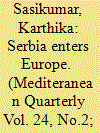| Srl | Item |
| 1 |
ID:
180377


|
|
|
|
|
| Summary/Abstract |
Since the Second World War, globalization has been underpinned by a liberal international order, a rules-based system structured around the principles of economic interdependence, democracy, human rights and multilateralism. However, the relationship between international mobility and the liberal international order (LIO) is contested. In the article, I disaggregate ‘international mobility’ into three regimes: the travel regime, the voluntary (labour) migration regime, and the refugee regime—each governed by distinct norms and operating procedures. I outline the characteristics of the LIO that pertain to international mobility and provide evidence to demonstrate that none of the three dimensions of international mobility—travel, migration, and asylum—reflects these characteristics. Given the LIO principles enumerated above, the exclusion of international mobility from the LIO is surprising. I survey the scholarship on the LIO and international mobility and argue that the exclusion of international mobility from the LIO rests on benefits provided to core states by the status quo ante governing international mobility. That is, the status quo ante permits countries of destination to determine the level and type of cross-border mobility. Thus, international mobility continues to be underpinned by the play of state preferences rather than the principles of the LIO. The COVID-19 pandemic is likely to shape these norms and operating procedures in ways that reinforce the status quo.
|
|
|
|
|
|
|
|
|
|
|
|
|
|
|
|
| 2 |
ID:
120905


|
|
|
|
|
| Publication |
2013.
|
| Summary/Abstract |
In 2009, citizens of Serbia were finally allowed to make short trips to Schengen zone countries without visas. This represented a victory for the regime in Belgrade. A whole generation of Serbians had been held back from European travel by the visa requirement that was introduced as Yugoslavia disintegrated. However, this victory came at a price. Schengen countries worried that the lifting of the visa barrier would trigger a flood of illegal workers and asylum seekers from Kosovo. The Serbian government, which considers Kosovo to be an autonomous province, had to come up with an expedient solution to reassure wealthier European countries that allowing Serbians to "enter" would not open the gates to a large number of problematic visitors. Eventually, Belgrade agreed to restrict the privilege of visa-free travel for residents of Kosovo, formally differentiating Kosovar citizens from "normal" citizens. The imperatives of international mobility have forced a country, in a sense, to redraw its boundaries and to acknowledge a different status for a section of its population from a province that it continues to claim. This essay unpacks the puzzle of why supporters of the "integral Kosovo" position in Serbia resigned themselves to the compromise. The central argument is that states seek to secure mobility not only for economic reasons but also to mark themselves as normal, respectable members of the international community. Serbia's visa waiver decision provides a lens with which to view issues of mobility and national identity in one of the most complex and divided regions of the world.
|
|
|
|
|
|
|
|
|
|
|
|
|
|
|
|